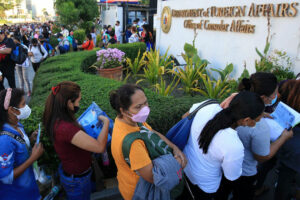DLSU and ADMU tie up to boost social entrepreneurship

SOCIAL ENTREPRENEURSHIP enabled by the academe can boost the sustainable economic development goals of the country, according to universities.
The De La Salle University (DLSU) and Ateneo de Manila University (ADMU) signed a three-year memorandum of understanding (MoU) targeting the fields of social entrepreneurship and sustainability on Tuesday.
The MoU is led by the Lasallian Social Enterprise for Economic Development (LSEED) Center and Ateneo Center for Social Entrepreneurship (ACSEnt) for mobilizing internal and external stakeholders to share good practices and localize the sustainable development goals (SDG) of the United Nations (UN).
“This partnership aims to forge pathways and produce synergies for social entrepreneurs to become bold and innovative leaders, doers, and dreamers who will impact their communities and the world around them,” Roberto C. Yap, ADMU president, said during the MoU signing.
“The role of the academe is not limited to educating minds but forming a generation that understands the value of education in real life,” said Norby Roque Salonga, founding director of the LSEED Center.
“I am confident that we can inspire more institutions to use social entrepreneurship as a sustainable approach to development,” said Fritzie Ian P. de Vera, vice-president for Lasallian Mission at DLSU.
“We hope to create greater impact by working with young people and communities to transform society,” she added on promoting innovative inclusion through community-student partnerships.
There are 164,473 social enterprises in the Philippines, amounting to 17% of registered companies, according to estimates from the British Council and Philippine Social Enterprise Network in 2015-2017, which included financially unsustainable entities.
Among the social enterprises, 70% operated as micro, small, and medium enterprises (MSMEs), 23% as nongovernment organizations, and 6% as cooperatives.
The Asian Development Bank (ADB) reported that the size and scale challenges of social enterprises include access to capital, innovative financial mechanisms to unlock additional capital, ecosystem knowledge of social enterprises, and data on social enterprise impact.
“Social enterprises have enormous potential to bring financially sustainable, market-based approaches to help achieve national goals and the SDGs,” the ADB report said.
However, no targeted public sector support is available to social enterprises beyond what is available to regular businesses or MSMEs, it added.
“Our good reputation in the SE (social enterprise) sector and efforts to expand our reach in terms of linkages with both public and private sectors are now in place,” Mr. Salonga said on mobilizing stakeholders to improve capacity-cooperation building and resource generation endeavors for the sector.
Among other programs, the MoU will leverage the LSEED Center’s committee membership in the MSME Development (MSMED) Council under the management and labor capacities since 2017, alongside ACSEnt’s National Social Enterprise Conference as a national platform to discuss important developments.
“We are currently co-leading a social enterprise profiling effort nationwide to update the number spread impact and models of social enterprise segments,” Mr. Salonga said.
The LSEED Center is an active member of the Poverty Reduction through Social Entrepreneurship (PRESENT) Coalition, which helps government agencies develop responsive SE programs and policies at both the national and local levels.
“No institution can do it alone,” said Maria Luz C. Vilches, vice-president for higher education at ADMU.
“This is a very good opportunity for our resources, strengths, and expertise to come together.” — Miguel Hanz L. Antivola




